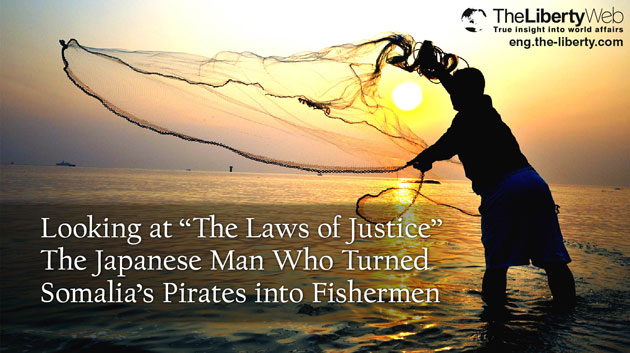The Japanese Man Who Turned Somalia’s Pirates into Fishermen
Looking at "The Laws of Justice"
Terrorism intensifies in the Middle East, and the conflicts show no signs of ending. Greece faces a financial crisis and the EU is on the verge of collapse. North Korea is experimenting with nuclear weapons, and China is strengthening its military.
In his 2000th book “The Laws of Justice”, Master Ryuho Okawa founder of Happy Science has indicated where true Justice lies in a world filled with these problems, from the vantage point of God.
This article aims to take a closer look at chapter 3 section 5 of the book: “How to Look at Progress and Prosperity: Sending a Message from Japan to the World”
Somalia and the Seas with the Greatest Number of Pirate Attacks
This chapter discusses the way in which Japan ought to contribute to the world. In it, Master Okawa advances the following:
I think it is better to teach people ‘how to fish’ rather than just giving them the fish. If we just give them fish, without question the stock will run out. If we teach them ‘how to fish’, however, those who learn will be able to catch fish for the rest of their lives.
There is a certain man who is currently putting this into practice. His name is Kiyoshi Kimura, the chairman of Kiyomura, a company that established the famous sushi restaurant chain Sushi-Zanmai. Kimura frequently visits Somalia in East Africa, to teach the people literally ‘how to fish’.
The most interesting part is that he is not teaching ordinary people: he teaches pirates.
According to research by the International Maritime Bureau (IMB), there were 237 pirate attacks near Somalia in 2011. This was the greatest number of attacks in the world, and 2011 was the year Kimura began his associations with the Somali pirates.
“Let’s Live, Proud that We Support Our Families with Money We Make Ourselves.” – Kimura
Why Did Kimura Risk Going into Dangerous Territory?
He said:
I went to meet Somali pirates using my connections. Meeting them, I realized that they aren’t being pirates because they really want to. “Then why not fish for tuna here?” I said to them. “Let’s live, proud that we support our families with money we make ourselves.
He didn’t put his own profits first, but really thought about how to make them happy. Through thinking about others, he was able to teach them how to fish tuna, and thus handed them the ability to make a living by fishing tuna. In addition, Kimura used to belong to the Japan Self-Defense Forces. His sense of Justice to protect the safety of the country may have also moved him into action.
Then, something amazing happened.
In late 2011, pirate incidents began to lessen, and in 2015 there were almost none. The primary reason may be that the Self-Defense Forces strengthened its surveillance, but it is impossible to ignore the effect of Kimura’s selfless contributions. Kimura was credited for having changed pirates into fishermen, and he has received a medal from the government of the neighboring country, Dibouti.
Using High-Level Skills in Job Creation
The pirates are now able to contribute to society, as they gained the ability to ford through life with their own hands, thanks to Kimura’s job creation. This sort of self-help life is a life to be proud of. Kimura has set an example for one possibility for Japan to support other countries.
One reason people in developing countries suffer from poverty and end up turning to crime is that they have no jobs. Japan can use its high-level skills to create jobs with high added value, in order to support developing countries. Job creation is Japan’s current mission.



















